Relations between Tajikistan and Pakistan — a story of an evolving partnership. Reflections of the Ambassador of the Islamic Republic of Pakistan to Tajikistan
Read also
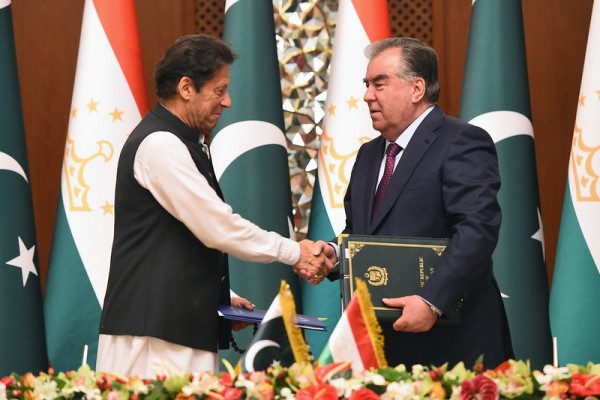
DUSHANBE, 20.09.2021 / NIAT «Khovar» /. As previously reported, on September 16-17, the Prime Minister of the Islamic Republic of Pakistan, Imran Khan, paid an on an official visit to Tajikistan to participate in the jubilee meeting of the SCO Council of Heads of State. As a result of meetings and negotiations at the highest level, 10 new documents on cooperation were signed in the presence and with the participation of Heads of the two StatesEmomaliRahmon and Imran Khan.
Ambassador Extraordinary and Plenipotentiary of the Islamic Republic of Pakistan to the Republic of Tajikistan Imran Haydar in an interview with NIAT «Khovar» shared his reflections on the history of the developing partnership between the two countries.
“Prime Minister Imran Khan visited Tajikistan on September 16-17, 2021 to participate in the 20th anniversary summit of the Shanghai Cooperation Organization (SCO). After the summit, he paid an official visit to Tajikistan. The first visit of the Prime Minister to Tajikistan took place shortly after the fruitful visit of the President of Tajikistan EmomaliRahmon to Islamabad, which took place in June 2021. As the leaders of both countries share the common goals of peace, progress and prosperity for their people and the region as a whole, the visit will help transform Pakistani-Tajik relations into strong bonds of brotherhood and strategic partnership.
Tajikistan gained independence in 1991 after the collapse of the Soviet Union. This is a landlocked country. Tajikistan covers an area of 143,100 square kilometers and has a population of about 9.5 million. About 93% of the territory of Tajikistan is occupied by mountains with a cascade of rivers, rich in minerals. The country has an amazing natural beauty that strikingly resembles our northern regions with rivers and lakes. The famous Pamir Mountains, also known as the «Roof of the World», are located in the southeast of Tajikistan. It borders Afghanistan to the south, Uzbekistan to the west, the Kyrgyz Republic to the north, and China to the east. Although Tajikistan has a secular constitution, 98% of its population areMuslims.
It should be noted that immediately after gaining independence, the country plunged into a bloody civil war that lasted from 1992 to 1997. The civil war ended in a peaceful ceasefire, which is a unique historical event. Today, Tajikistan has a literacy rate of about 98% and has a well-developed infrastructure, especially in the areas of health, education and transport.
Despite the fact that Tajikistan gained State independence in 1991, it is the cradle for several ancient civilizations dating back to the 4th millennium BC. Islam entered modern Tajikistan in the 8th century. Later, the Samanid dynasty was founded in the region, which ruled from 819 to 999 AD. The Tajik people consider the emir of the Samanids, or Abu Ibrokhim Ismail ibn Ahmad Somoni, as the the founder of the Tajik statehood. The national currency of Tajikistan — somoni is also named after him. Today’s Tajikistan, after a long time, became an autonomous republic of the former Soviet Union, and in 1929 — a union republic.
Pakistan was one of the first countries to recognize Tajikistan after independence. Pakistani-Tajik relations are based on a common history, faith and culture. Geographically, the two countries are actually neighbors and are separated only by a narrow strip of the Wakhan corridor in Afghanistan, which in some places is only a few kilometers wide.
Pakistan seeks to expand cooperation with the Central Asian republics. In this regard, we are working on a result-oriented, comprehensive and sustainable policy in Central Asia. This trust policy is based on five pillars: 1 — politics, 2 — trade and investment, 3 — energy and communications, 4 — security and defense, and 5 — relations between people. This policy guides our relationship to long-term strategic partnership with the Central Asian republics.
Over the past three decades, the friendship between Pakistan and Tajikistan has become an example of good neighborliness in the international political arena. To date, both sides have signed more than 80 bilateral documents in the field of institutionalizing and expanding our bilateral cooperation in various fields of mutual interest. As a result, the two brotherly countries are now moving towards a strategic partnership, and friendship between Pakistan and Tajikistan is developing successfully in many areas.
The two countries have established an interdepartmental commission and several joint working groups in various fields, including trade and economy, energy, transport, education, science, culture and tourism, to further deepen and diversify these ties. An inter-parliamentary friendship group and a joint business council have also been created to strengthen bilateral ties in relevant areas.
In terms of multilateral cooperation, there are significant similarities between the two countries on various regional and international issues. In addition to the United Nations, our joint membership in the OIC, SCO, ECO and ITC has further strengthened our bilateral cooperation in a multilateral framework. The two countries always support each other in various international and regional forums.
As part of the visit of the Prime Minister to Tajikistan from September 16, 2021, the first joint Pakistani-Tajik business forum was organized and held in Dushanbe. Several meetings were held in the B2B format to establish direct trade ties between the business communities of the two countries. A delegation of high-level entrepreneurs arrived from Pakistan to participate in the forum in Dushanbe.
The leaders of both countries know that our bilateral economic relations do not correspond to the level of existing political ties. According to Tajik customs statistics, the annual volume of our bilateral trade in 2020 was about $ 25.79 million. On the one hand, it shows great potential that has not yet been exploited, and on the other hand, it reflects instability and inconsistency in the form of trade. This is largely due to the security situation in Afghanistan in recent decades, as most of our bilateral trade with Tajikistan passes through Afghanistan. In other words, the main obstacle to the growth of our bilateral trade is the lack of direct road, rail and air links. Both sides recognize that expanding opportunities for cooperation is key to increasing bilateral trade, developing people-to-people contacts and developing tourism. Thus, at present, both sides are considering all possibilities for the early resumption of direct flights between the two countries.
The China-Pakistan Economic Corridor (CPEC), which is a very important component of a major project in China, is poised to create a better infrastructure and mechanism for cooperation in the region and beyond. The newly planned rail line linking Pakistan to Uzbekistan via Afghanistan is also a welcome step in expanding regional ties, as its completion will help connect Pakistan to other Central Asian countries, including Tajikistan, by rail.
Pakistan’s important geostrategic position in the region allows it to become a natural link between Central Asia and the Arabian Sea. Thus, Tajikistan is looking forward to the opportunity to connect with the outside world, including Southeast Asia, the Middle East and Africa, through our seaports. Likewise, Tajikistan is the gateway to Central Asia and beyond for Pakistani products.
In the area of defense and security, Pakistan and Tajikistan see peace as the key to economic progress and prosperity, and the threats of extremism, terrorism and transnational organized crime as driving forces of instability and violence. This common understanding in our bilateral relations has prompted a mutual determination to eradicate this evil in both countries, in the region and in the world. Thus, both sides are now intensifying their joint efforts in this direction.
In the energy sector, CASA-1000 is a flagship project between Pakistan and Tajikistan as it involves the supply of surplus electricity from the Kyrgyz Republic and Tajikistan to Afghanistan and Pakistan during the summer when Pakistan needs it most. According to the conditions, a 47 km power line will be laid between the Kyrgyz Republic and Tajikistan, and 750 kilometers between Tajikistan and Pakistan through Afghanistan. The project is the first practical step towards connecting Central Asia with energy-rich South Asia, creating a permanent energy corridor and opening up new opportunities for energy trade in the region.
While cultural and scientific ties, as well as relations between people, bring nations closer together, both countries use every opportunity to share cultural ties and build bridges between our peoples, artists, scientists and institutions. Pakistan is already promoting its cultural heritage, including art, clothing and food, through various exhibitions and events that take place in Tajikistan from time to time.
Our two peoples are also connected by amazing literary ties, since they are followers of the universal and peaceful messages of enlighteners and famous figures such as the scientist Muhammad Iqbol, Faiz Ahmad Faiz, Sayyid Ali Hamadoni, SadriddinAini and others. Scientist Muhammad Ikbol is very popular in Tajikistan, his works are included in the curriculum of Tajikistan. Likewise, there are several thousand followers of Sayyid Ali Hamadoni in Pakistan and Kashmir.
The famous Tajik scholar Ali Muhammad Khurosoni was awarded the Honorary Prize of the President of Pakistan in 2015 for outstanding service in the study of the poetry of the scholar Muhammad Iqbol. A Pakistani training center has been established at the Urdu Faculty of the Tajik National University in Dushanbe. The center was founded by the Embassy in 2009 and assists Tajik students in their research work in Urdu and other languages of Pakistan.
Since I received this message two years ago, I have come to the conclusion that Tajiks are very generous and hospitable people. They are peaceful and hardworking people with exemplary civic traits. Most importantly, they strive with patriotic zeal to transform their homeland into a proud country in a community of nations. All these distinctive features indicate not only the rich culture and advanced character of the Tajik people, but also the forward-looking leadership of the President of Tajikistan, his excellencyEmomaliRahmon, whose consistent efforts have led to the development, progress and prosperity of Tajikistan.
On this basis, both sides expressed satisfaction with the results of the recent visit of Prime Minister Imran Khan to Dushanbe. The leaders of the two countries reviewed the entire spectrum of bilateral relations and took new steps to implement a future strategy aimed at further strengthening friendship between Pakistan and Tajikistan. «
PHOTO of the Press Service of the President of the Republic of Tajikistan / NIAT «Khovar»










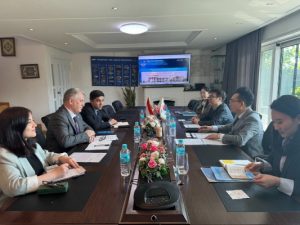 Director of the International Centre for Water Security & Sustainable Management Invited to the Third Dushanbe Water Conference
Director of the International Centre for Water Security & Sustainable Management Invited to the Third Dushanbe Water Conference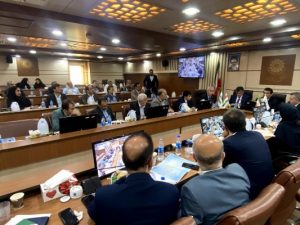 Economic Potential of Tajikistan Presented in the Iranian Bushehr Province
Economic Potential of Tajikistan Presented in the Iranian Bushehr Province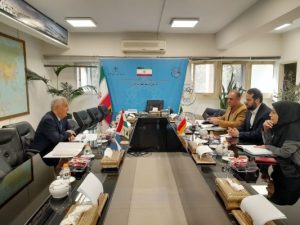 Tajik Delegation to Attend the Iran Expo-2024
Tajik Delegation to Attend the Iran Expo-2024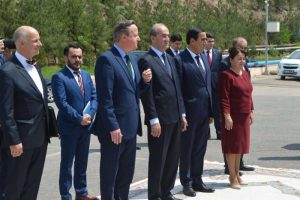 David Cameron: Britain Wants to Support Large Hydropower Projects for the Production of Green Energy in Tajikistan
David Cameron: Britain Wants to Support Large Hydropower Projects for the Production of Green Energy in Tajikistan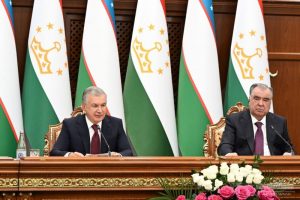 Shavkat Mirziyoyev Calls the Signing of the Treaty on Allied Relations a New Historical Milestone in Bilateral Relations
Shavkat Mirziyoyev Calls the Signing of the Treaty on Allied Relations a New Historical Milestone in Bilateral Relations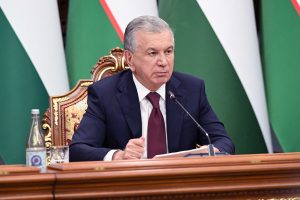 Shavkat Mirziyoyev: Uzbekistan Wll Continue to Support the Sincere Aspirations of the Hardworking and Noble Tajik People
Shavkat Mirziyoyev: Uzbekistan Wll Continue to Support the Sincere Aspirations of the Hardworking and Noble Tajik People













